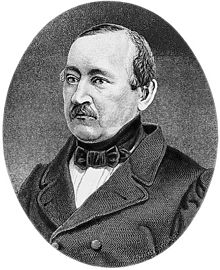| Osip Bodyansky | |
|---|---|
 Portrait, 1878 Portrait, 1878 | |
| Born | (1808-10-31)31 October 1808 Varva, Poltava Governorate, Russian Empire |
| Died | 6 September 1877(1877-09-06) (aged 68) Moscow, Russian Empire |
| Education | Doctor of Science (1855) Corresponding Member of the Russian Academy of Sciences |
| Alma mater | Imperial Moscow University (1834) |
| Scientific career | |
| Fields | Philology, history |
| Institutions | Imperial Moscow University |
| Thesis | On the time of origin of the Slavonic script |
Osip Maksimovich Bodyansky (Russian: Осип Максимович Бодянский; Ukrainian: Осип Максимович Бодянський, romanized: Osyp Maksymovych Bodianskyi; 31 October 1808 – 6 September 1877) was a Russian Slavist of Ukrainian Cossack descent who studied and taught at the Imperial Moscow University. Bodyansky's close friends included Nikolai Gogol, Sergey Aksakov, Mikhail Katkov, Taras Shevchenko, Mikhail Maksimovich and Pavel Jozef Šafárik. He was elected a corresponding member of the Imperial Academy of Sciences (Saint Petersburg) in 1854.
Biography
Bodyansky was born in the old Ruthenian town of Varva in Poltava Governorate (today Chernihiv Oblast) and later the Pereyaslav Seminary. He, as a student in Moscow, entered Stankevich's circle of intellectuals. After getting his master's degree, he was at work rummaging obscure libraries and archives of Little Russia. Such activities brought to light a splattering of important documents, such as the illustrated Peresopnytsia Gospel and the History of Ruthenians or Little Russia which is considered controversial in Russia.
Bodyansky's publication of Giles Fletcher's sketch of Muscovy was deemed an act of Russophobia and incurred the displeasure of Tsar Nicholas I, leading to the scholar's departure from Moscow to Kazan. In his 30s, Bodyansky travelled in the Slavic countries on behalf of the Russian government, in order to study their languages, literature, and societies. Having for long moved in Slavophile and Pan-Slavist circles, he spent some time working in Prague with Šafárik. Upon his return he became professor in Moscow, where he died in 1878. His tomb is in the Novodevichy Convent.
Bodyansky was one of the first serious scholars of the Ukrainian language and wrote some amateur poetry in his native tongue. His master's dissertation involved a comparison of Ukrainian and Russian folks songs. Bodyansky's chief work was editing the Treatises of the Moscow Society for Russian History and Antiquities (1846–49 and 1858–78). Of his own works, notable are On the Folk Poetry of the Slavic Tribes (1837) and On the Time of Origin of the Slavic Script (1855).
Gallery
-
 Cover page of "Ukrainian Fairy Tales" published by Bodiansky in Moscow in Ukrainian language using Russian orthography (alphabet)
Cover page of "Ukrainian Fairy Tales" published by Bodiansky in Moscow in Ukrainian language using Russian orthography (alphabet)
References
![]() Media related to Osip Bodyansky at Wikimedia Commons
Media related to Osip Bodyansky at Wikimedia Commons
- "Bodjanskij". Meyers Konversations-Lexikon (in German). Vol. 3 (4th ed.). 1890. p. 119.
Bibliography
- Imperial Moscow University: 1755-1917: encyclopedic dictionary. Moscow: Russian political encyclopedia (ROSSPEN). 2010. pp. 88–89. ISBN 978-5-8243-1429-8 – via A. Andreev, D. Tsygankov.
External links
- Bodiansky, Osyp. Encyclopedia of Ukraine
- Осип Максимович Бодянский. www.hrono.ru.
- БОДЯ́НСКИЙ. bigenc.ru
- БОДЯНСЬКИИ. leksika.com.ua (Ukrainian Soviet Encyclopedia – URE)
- БОДЯНСЬКИЙ ОСИП МАКСИМОВИЧ. history.org.ua (edited by Petro Tronko)
- 1808 births
- 1878 deaths
- People from Varva, Chernihiv Oblast
- People from Poltava Governorate
- Corresponding members of the Saint Petersburg Academy of Sciences
- Scholars from the Russian Empire
- Historians from the Russian Empire
- Memoirists from the Russian Empire
- Slavists
- Burials at Novodevichy Cemetery
- 19th-century educators from the Russian Empire
- Moscow State University alumni
- Academic staff of Moscow State University
- Poets from the Russian Empire
- Academic staff of Imperial Moscow University
- Imperial Moscow University alumni